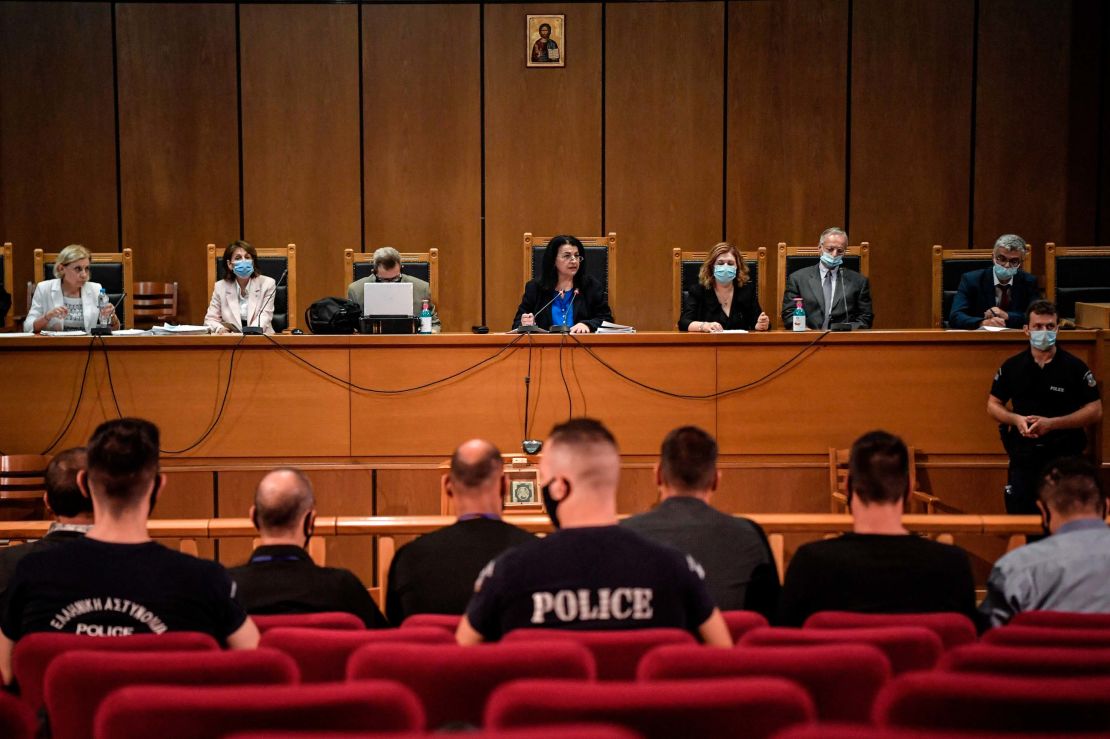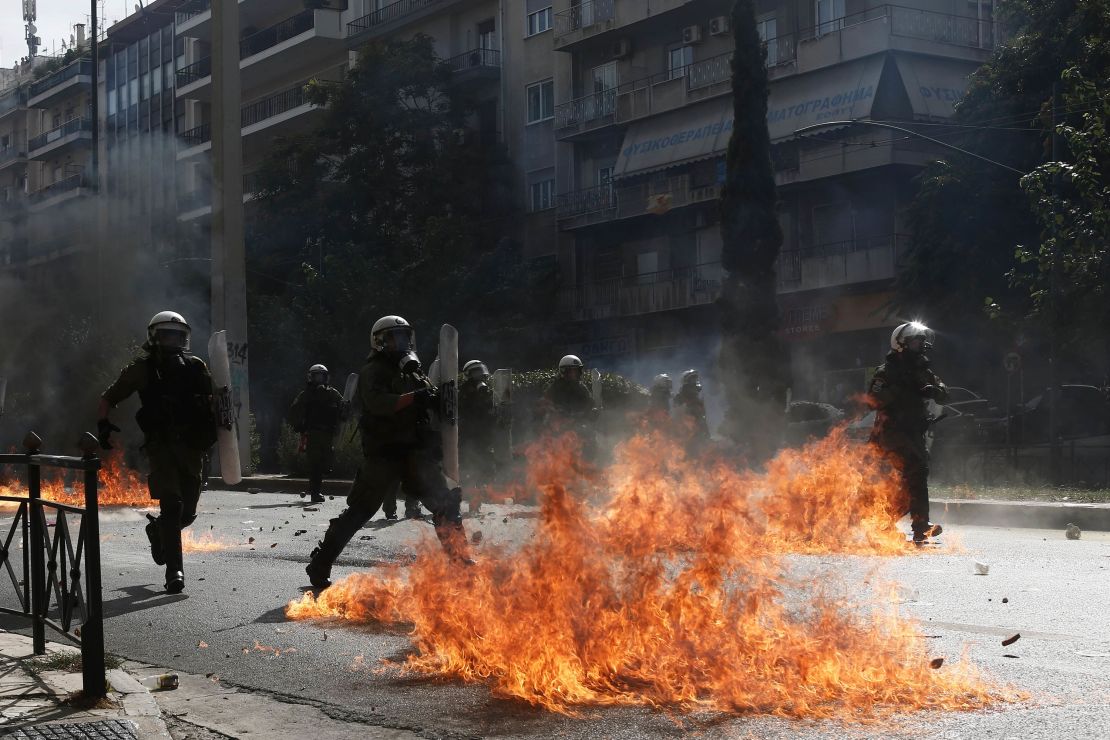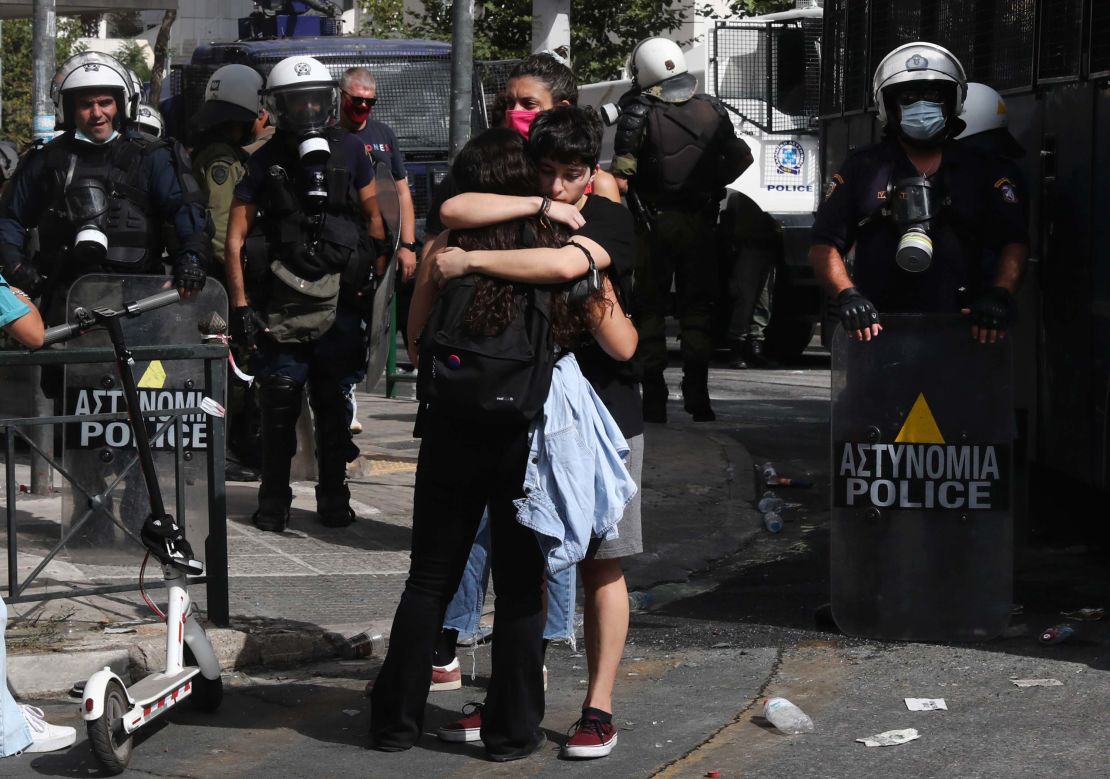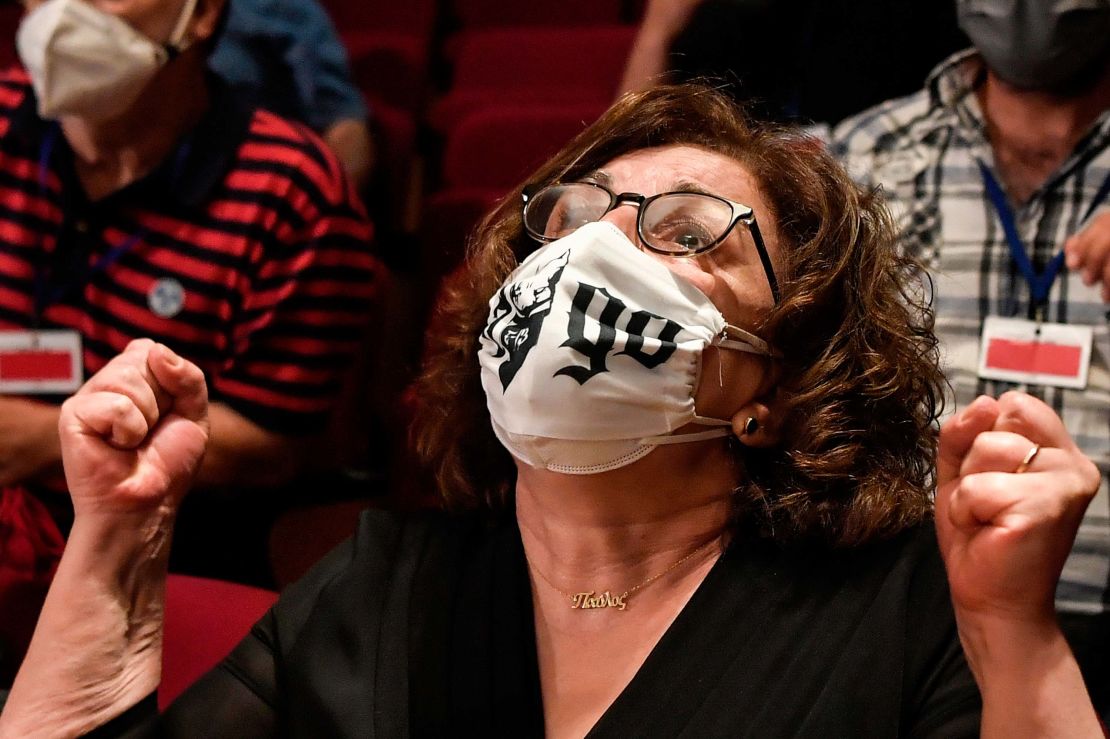The leaders of Greece’s neo-Nazi group Golden Dawn were found guilty Wednesday of forming and running a criminal organization under the cloak of a political party, in a landmark decision hailed as a victory for democracy and human rights.
Following a marathon trial lasting five-and-a-half years, an Athens court deemed that crimes by Golden Dawn members including murder, attempted murder, assault and possession of weapons were not the actions of individuals operating on their own initiative. Instead they were directly planned and ordered by a party leadership that employed violence to eradicate perceived enemies.
Eighteen former party lawmakers, including leader Nikos Michaloliakos, a holocaust denier who founded Golden Dawn in the 1980s as a neo-Nazi organization, were among those found guilty on Wednesday. Individual sentences are to be announced in the coming days.

There was a strong police presence around the court on Wednesday as left-wing parties, trade unions, and anti-fascist and human rights groups staged rallies to coincide with the verdict.
Protesters and riot police then clashed after the ruling. Police said a peaceful crowd of at least 20,000 people dispersed, but minutes after the verdict was announced, a smaller group of around 600 people attacked officers with stones and Molotov cocktails.

Prime Minister Kyriakos Mitsotakis tweeted that it was a “truly historic day for Greece, democracy and the rule of law.”
“Αfter the Greek people voted the neo-Nazi party of Golden Dawn out of Parliament in the last election, today the Greek justice system convicted its leadership of operating as a criminal organization,” he added.
The Golden Dawn leaders have denied the charges from the start, claiming they are victims of political persecution.
Dozens of others – party members and alleged associate – have been convicted on charges that range from murder to perjury. Most of these are linked to violent attacks between 2012 and 2013. They include the fatal stabbing of popular anti-fascist hip hop singer Pavlos Fyssas and attacks on immigrants and left-wing activists.
The decision concludes over 450 days in court and hundreds of testimonies and hours of data collected from the cellphones and laptops of those arrested. These include photos of Golden Dawn recruits at training camps posing with assault weapons and giving Nazi-type salutes.
“There is clear and unequivocal message in this landmark case, that hate crimes will no longer be tolerated, [the decision] can also have a significant impact on preventing racist violence in future,” Nils Muiznieks, head of Amnesty International Europe, said ahead of the verdict.
Thanassis Kambagiannis, a lawyer from the prosecution team, has described the trial as “the largest court hearing of Nazis since Nuremberg.”
The trial started in April 2015, with close to 70 members of Golden Dawn charged under the so-called “mafia clause.”

Among those present were victims of racist violence, some displaying knife scars, waving banners with the words: “They are not Innocent. Nazis in jail.”
Rich in symbolism, the verdict offers a moment of catharsis in a country still healing from the wounds of its recent economic and political past, turmoil that pushed voters to extremes.
The verdict is “a strong institutional embankment against violence. It shows that democracy disposes instruments and institutions which can punish organized totalitarian, anti-democratic practices and criminal actions,” said Lamprini Rori, a lecturer in politics at the UK’s University of Exeter.
The rise of Golden Dawn
Golden Dawn began in the 1980s as the brainchild of Nikos Michaloliakos, who had been handpicked by one of Greece’s former dictators to lead a far-right youth party after the fall of the country’s seven-year military regime, and the restoration of democracy, in 1974.

Investigative journalist Dimitris Psarras, who has written extensively about Golden Dawn, has said that the party was from the very first day founded to “promote Nazi ideology,” and “never stopped believing in racism and anti-Semitism.”
Golden Dawn’s phenomenal ascent in recent years was directly linked to the Greek financial crisis that began in 2010. A fringe group with just 0.3% of the vote in 2009, Golden Dawn skyrocketed to a 7% share in the 2012 election, which came after two belt-tightening bailouts in two years from the country’s creditors – the European Union, the European Central Bank and the International Monetary Fund.
The turmoil offered little hope for a country feeling increasingly betrayed by its political leaders, its European peers, and international institutions.
With an economy comparable to that of America’s Great Depression and youth unemployment hovering at 50%, Golden Dawn exploited the resulting anger, despair and lack of rule of law to infiltrate the country’s mainstream politics.
It entered the 300-seat parliament with 18 MPs, on its way to becoming Greece’s third largest political force. It was the first time since World War Two that an overtly Nazi group had gained such prominence in a European country.
To embed its foothold, Golden Dawn focused on ‘the common man,’ engaging with communities and occupying the space the struggling state was unable to fill. With more people dependent on food coupons, the party created food distribution networks, and later blood banks – but these, like everything else the party offered, were strictly for ‘Greeks only.’
The fervently anti-migrant party openly used venomous rhetoric against foreigners, with leadership figures saying they were “looking for ways to clean the stench.”
Golden Dawn’s words and actions became more openly extreme as its popularity grew. Reports of street violence – primarily against migrants, but also political opponents and members of the LGBTQ community – became frequent. Torchlit rallies grew, with supporters raising their arms in fascist salutes.
Europe’s far-right parties were quick to distance themselves. Instead the Golden Dawn brand, with a logo closely resembling the swastika and almost identical slogans to those once used by the Hitler Youth, became increasingly attractive to ultra-right wingers from around the world who flocked to Greece to learn from the party’s methods.
Among them was Andrew Anglin, editor of The Daily Stormer, one of the biggest neo-Nazi websites in the US, who attended Golden Dawn meetings.
The beginning of the end
The murder of 34-year-old anti-fascist rapper Pavlos Fyssas, who was stabbed by a self-professed Golden Dawn sympathizer in Athens in September 2013, led to widespread shock among the Greek public.
A swift crackdown followed, with the party’s leader and lawmakers arrested and placed in pre-trial detention. They denied any direct links to Fyssas’ murder and other attacks, and claimed to be the victims of political persecution.
Throughout the trial, prosecutors argued that Golden Dawn operated as a paramilitary group, with the party leadership instigating violence.

Despite the arrests, Golden Dawn’s popularity continued to rise, but its electoral base shifted from urban areas to other parts of the country, including islands struggling to cope with a large influx of migrants and refugees.
The trial began in spring 2015, a few months after national elections that brought to power Greece’s first hard left government and saw Golden Dawn come in third as the country unraveled into a political dystopia.
The year that followed, more than 1 million migrants and refugees reached Europe’s shores through Greece, sparking the biggest refugee crisis in EU history.
A cautionary tale
Seven years on from Fyssas’ death, Golden Dawn stands deflated and fragmented. The victory of the center-right party New Democracy in the 2019 elections, the first since Greece’s exit from its bailout regime a year earlier, signaled a clean break with years of firebrand populism and a return to mainstream politics. For the first time since entering parliament, Golden Dawn failed to win a seat.
But worrying signs persist. As prosecution lawyer Thanassis Kambagiannis explains, “Greece’s constitution does not allow the outlawing of political parties. This does not exist in the country’s legal system. And there is no law to stop the founding of any new party.”
The breakaway party Greeks for the Homeland, led by Ilias Kassidiaris – a prominent Golden Dawn figure who once famously slapped a female leftist politician during a live TV program – is gaining ground on an anti-migrant ticket, according to recent polling. That is despite Kassidiaris being among those tried, and now convicted.
Violence against immigrants and refugees linked to extreme-right groups has been reported on a number of occasions since the trial started, primarily on islands that host large migrant camps.
To prevent extremism from resurfacing, Rori says, the issues that foster extremism must be tackled. “If the government’s capacity in managing immigration proves low this can eventually foster electoral demand for anti-immigrant party choices.”

